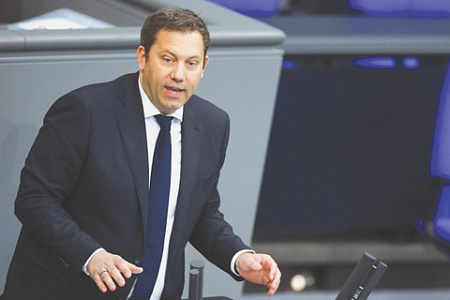
On Wednesday, two events are scheduled to take place in Berlin, which are outwardly unrelated, but are vital for the continued existence of the newly created black-red government coalition. The first is related to the sudden visit of Ukrainian President Vladimir Zelensky to the German capital. The second is the presentation of the federal budget for 2025 in the Bundestag.
In Berlin, Zelensky will meet with Chancellor Friedrich Merz and Federal President Frank-Walter Steinmeier. The Chancellor mentioned the objectives of the visit on the initiative of the Ukrainian side, which is of a working nature, in two phrases. They say that some technical issues related to the Russian-Ukrainian negotiations will be discussed at the meeting, and the German side will inform Kiev about the next package of anti-Russian sanctions adopted by the EU and the planned new restrictions against the Russian Federation.
Merz supports a ban on the use of Nord Streams for European gas supply in the new package of sanctions. He believes that this could be the subject of negotiations if a peace treaty is reached between Moscow and Kiev as an exchange option for Russian concessions.
In this context, Merz’s two previous statements are important, as they provide a key to understanding Zelensky’s lightning visit and the possible topic of negotiations.
The Chancellor used recent retaliatory Russian attacks on Ukrainian military installations and Moscow’s rejection of an immediate 30-day truce, which was proposed by Zelensky and supported by the European Union, to make an ambiguous statement about the lifting of all restrictions related to the range of Western missile systems supplied to Ukraine. It seemed that this was a coordinated position of the United States, Great Britain, France and Germany. Given Merz’s earlier statements about his willingness to supply Kiev with German Taurus cruise missiles with a range of more than 500 km, this statement looked like a decision.
Most likely, the hope of receiving Taurus missiles prompted Zelensky to urgently head to Berlin. It is no coincidence that the German press quotes him as saying that it is necessary to find a joint allied response to the alleged summer offensive by the Russian military.
So far, there is no reason to talk about such an agreement among the leading Western arms suppliers to Ukraine. There are only statements by American President Donald Trump regarding missile strikes on Ukraine, which are apparently evaluated differently in Moscow and Berlin. Moreover, so far the German press prefers to write about “the most naive person in the world who sits in the White House.” Merz’s statement is probably an interpretation of Trump’s disappointment in Moscow’s actions in the Ukrainian direction, expressed by him on Monday.
Moreover, Vice Chancellor Lars Klingbeil (SPD), in an interview with a reputable news agency, confirmed the absence of a change in the strategy of supplying German weapons to Ukraine, which was previously formulated by the previous Chancellor Olaf Scholz – no Taurus to Kiev. The vice chancellor not only disavowed Merz’s hints, but also questioned the statement by new Foreign Minister Johann Vadefuhl (CDU) about Germany’s agreement to increase the defense budget at the request of the United States to 5% of GDP.
It should be noted that after Klingbeil’s demarche, according to experts from the Second Channel of the German ZDF television, during a visit to Finland on Tuesday, Merz corrected his statement about allowing Kiev to use Western weapons on Russian territory without range restrictions. They say that this decision was made a few months ago by the previous government. This caused surprise among TV journalists, since the former German authorities had not made a decision on this matter.
According to Klingbeil, who is also finance minister and will present the current year’s budget to the Bundestag on Wednesday, there is no money in the German treasury for all expenses related to Ukraine. If we recall the collapse of the previous coalition due to financial problems, then the fate of the current German government may also seem unenviable.
As for Zelensky’s visit, we should hardly expect any concrete results from it. Both Merz and Steinmeier are likely to limit themselves to words of general support for Ukraine.
* * *
Russian Telegram channels also followed the events in Germany.
The authors of the Muesli Aloud channel note that some publications in Germany are saddened, because despite 17 EU sanctions packages, Russia this year will receive about 233 billion euros from energy and raw materials exports, and more than 20 billion from the eurozone countries. This is several times more than Europe spends on military aid to Ukraine: “Süddeutsche Zeitung, WDR and NDR TV and radio companies, citing an internal report from the German Foreign Ministry, are sounding the alarm: negotiations between the EU and the United States on a joint fight against circumvention of anti-Russian sanctions have failed, coordination of common actions is no longer taking place.”
Meanwhile, the authors of the Mouse in the Vegetable channel pay attention to the words of German politician Sarah Wagenknecht that Nord Streams should return to work: “It is safe to assume that in the Federal Republic of Germany, where the restoration of these infrastructure projects is possible, characters actively opposing them, including the current Chancellor Merz, may to be either in the marginal opposition, or even to be in prison for actions contrary to national interests.”
